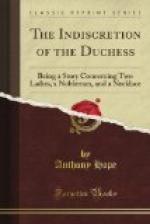“They’ve got the safe open. Now they’ll find the small portable safe which holds the necklace.”
And I could make out an amused smile on his pale face. Before I could speak, he turned and began to crawl away. I followed. We descended the stairs again to the hall. At the foot he turned sharply to the left, and came to a standstill in a recess under the staircase.
“We’ll wait here. Is your pistol all right?”
“Yes, all right,” said I.
And, as I spoke, the faintest sound spread from the top of the stairs, and a board creaked under the steps of a man. I was close against the duke, and I felt him quiver with a stifled laugh. Meanwhile the Cardinal’s Necklace pressed hard against my ribs under my tightly buttoned coat.
CHAPTER XIV.
For an Empty Box.
When I look back on the series of events which I am narrating and try to recover the feelings with which I was affected in its passage, I am almost amazed and in some measure ashamed to find how faint is my abhorrence of the Duke of Saint-Maclou. My indignation wants not the bridle but the whip, and I have to spur myself on to a becoming vehemence of disapproval. I attribute my sneaking kindness for him—for to that and not much less I must plead guilty—partly indeed to the revelation of a passion in him that seemed to leave him hardly responsible for the wrong he plotted, but far more to the incidents of this night, in which I was in a manner his comrade and the partner with him in an adventure. To have stood shoulder to shoulder with a man blinds his faults—and the duke bore himself, not merely with the coolness and courage which I made no doubt of his displaying, but with a readiness and zest remarkable at any time, but more striking when they followed on the paroxysm to which I had seen him helplessly subject. These indications of good in the man mollified my dislike and attached me to him by a bond which begot toleration and resists even the clearer and more piercing analysis of memory. Therefore, when those who speak to me of what he did and sought to do say what I cannot help admitting to be true, I hold my peace, thinking that the duke and I have played as partners as well as on hostile sides, and that I, being no saint, may well hold my tongue about the faults of a fellow-sinner. Moreover,—and this is the thing of all strongest to temper or to twist my judgment of him,—I feel often as though it were he who laid his finger on my blind eyes and bade me look up and see where lay my happiness. For it is strange how long a man can go without discovering his own undermost desire. Yet, when seen, how swift it grows!




